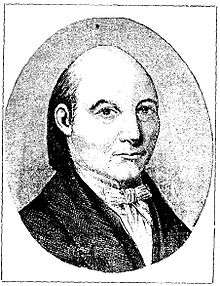Jesse Mercer

Jesse Mercer (1769–1841) was a prominent Baptist minister and eponym of Mercer University in the U.S. state of Georgia.[1]
Early life
Born in the Province of North Carolina on December 16, 1769, he was the son of Silas Mercer, a Baptist minister who moved his family to Wilkes County, Georgia in the early 1770s.[2] Silas Mercer founded several pioneer churches and convinced his son to follow him into the ministry.
Entering the Ministry
Jesse Mercer was baptized by his father at the age of 17, married Sabrina Chivers of Wilkes County at age 19, and was formally ordained into the ministry at age 20.[3] Sardis Church, originally called Hutton's Fork, was his first charge. In 1796, Mercer succeeded his father as pastor of the Phillips' Mill Church, which he served for 37 years.[4] He also served as pastor of Bethesda Church (1796-1827),[5] Powell's Creek Church, in Hancock County, Georgia (1797-1825), and the Baptist Church at Eatonton, Putnam County, Georgia (1820–26). In 1798, as a delegate to one of Georgia’s constitutional conventions, he wrote the section of the state constitution that secures religious liberty.[6] Mercer was president of the Georgia Baptist Convention for 19 years, from its founding in 1822 until his death in 1841.[3]
Marriages
Mercer's first wife died on September 23, 1826. He then moved to Washington, Georgia, and in December 1827 married Nancy Simons, a wealthy widow who joined him in making large gifts to Mercer Institute, a boys' manual labor school organized by the Georgia Baptist Convention in Penfield, Georgia. Mercer provided a founding endowment and served as the first chairman of the school's board of trustees.[7] In return, the school was named in his honor. The institute was renamed Mercer University in 1838 after the Georgia General Assembly granted a university charter.
Published works
Mercer published a popular hymnal titled Cluster of Spiritual Songs in 1810.[8] In later years, he also published the Christian Index, which became the newspaper of the Georgia Baptist Convention.[9] Mercer published a temperance newspaper in Washington, Georgia, though he at first was against the temperance movement.[10] In 1811 he wrote the circular letter for the Georgia Baptist Association in which he defended the Baptist rejection of alien immersion (immersions performed in non-Baptist churches) on the basis of Baptist successionism. In 1828, Mercer became the first pastor of Washington Baptist Church where he served until his death.[11] Mercer died in 1841 and is buried in Penfield Cemetery, Penfield, Georgia.
References
- ↑ "New Georgia Encyclopedia: Jesse Mercer (1769-1841)". Georgiaencyclopedia.org. 2005-03-26. Retrieved 2010-12-14.
- ↑ "Washington, Georgia". Kudcom.com. Retrieved 2010-12-14.
- 1 2 "Southern Baptist Historical Library & Archives - Jesse Mercer". Sbhla.org. Retrieved 2010-12-14.
- ↑ "Washington, Georgia". Kudcom.com. Retrieved 2010-12-14.
- ↑ "[Photograph of the exterior of Bethesda Baptist Church, Greene County, Georgia, 1976]". Vanishing Georgia. Digital Library of Georgia. Retrieved 5 July 2016.
- ↑ Williams, David S. (2008). From Mounds to Megachurches : Georgia's Religious Heritage. Athens: University of Georgia Press. p. 43. ISBN 978-0820337838. Retrieved 5 July 2016.
- ↑ "New Georgia Encyclopedia: Mercer University". Georgiaencyclopedia.org. Retrieved 2010-12-14.
- ↑ Blumhofer, Edith Waldvogel; Noll, Mark A.; Norton, Kay (2004). Singing the Lord's Song in a Strange Land : Hymnody in the History of North American Protestantism. Tuscaloosa: University of Alabama Press. p. 39. ISBN 978-0817355449. Retrieved 5 July 2016.
- ↑ "New Georgia Encyclopedia: Christian Index". Georgiaencyclopedia.org. 2002-11-20. Retrieved 2010-12-14.
- ↑ Coker, Joe L. (2007). Liquor in the Land of the Lost Cause : Southern White Evangelicals and the Prohibition Movement. Lexington: University Press of Kentucky. p. 25. ISBN 978-0-8131-2471-1. Retrieved 5 July 2016.
- ↑ "Washington, Georgia". Kudcom.com. Retrieved 2010-12-14.
Resources
- A dissertation on Mercer's life and frontier experience was completed in 1950 at the University of Texas by Robert W. Mondy, the late professor of history at Louisiana Tech University in Ruston, Louisiana.[1]
Further reading
- Julie Whidden Long (2008). "Jesse Mercer". Portraits of Courage: Stories of Baptist Heroes. Mercer University Press. ISBN 978-0-88146-109-1.
- Northen, William (1907–1912), "Jesse Mercer", in Northen, William, Men of Mark in Georgia, 3, Atlanta: A.B. Caldwell, pp. 40–47, OCLC 7068994
- ↑ "UT History Department: Graduates by Years (1950s)". utexas.edu. Retrieved June 19, 2010.